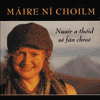
MÁIRE Ní CHOILM - Nuair A Théid Sé Fán Chroi
Cló Iar-Chonnachta CICD184
Máire, originally from An Screabán, Gaoth Dobhair in Donegal, is now living and working in Dublin as a lecturer in St. Pat's College in Drumcondra. Máire’s distinctive singing voice and interpretation of songs have won her many awards (including Oireachtas, Comórtas na mBan in 1997 and 2009; the All-Ireland Fleadh, Gaeilge 2005 and the Pan Celtic traditional singing competition in 2008); she’s also performed at Celtic Connections. It’s perhaps surprising to discover, then, that Nuair A Théid Sé Fán Chroí is her first solo CD.
It contains 15 tracks, of which nine are sung unaccompanied by Máire in approved sean-nós style. The disc opens with a well poised account of Tá Me I Mo Shuí, where Máire displays a naturally commanding sense of line and purpose that complements the strong timbre of her voice and enables an aftertaste that can be suitably bittersweet. This quality also surfaces to good effect on other songs with a comparably reflective flavour, like Nansaí Bhán Nic Giobarlai (which uses the melody of The Parting Glass). The disc’s key performances are very probably the measured and powerfully committed renditions of Ag An Phobal Dé Donhnaigh and (especially) Nighean An Bhaoigheallaigh and the closing lament Is Deas An Buachaill Fóinteach Mé. Elsewhere, the playful An Tsanbhean Bhocht forms a keen contrast (although I can’t quite get the “ball of yarn” connotation out of my brain…!), as does Beití Sailí Dan. Incidentally, the latter is one of the songs Máire has sourced from Tory Island (where her late uncle was a parish priest) – another being the album’s penultimate track, An Ghiobóg, a charming duet with Eoghan Mac Giolla Bhride, comes from the singing of Éamonn Mac Ruairí.
Halfway through the disc, as a kind of interlude I guess, comes the first of three items featuring a box player – the reel Damhsa Sciobóil, played as a solo by Máire’s father Gerry Ó Colm. An Chéad Mháirt D’Thómhar (fetchingly accompanied by Breanndán Ó Beaglaoich) then provides a further disc high-point, while Doimnic Mac Giolla Bhride does the honours in a more restrained fashion on Is Fada Ó Bhaile; finally, Conor Byrne provides a flute counterpoint to Máire’s singing on Tiocfaidh An Samhradh and Ciarán Ó Maonaigh embellishes Ar A Ghabháil Go Baile Átha Cliath Domh with hardanger and octave fiddles. It all adds up to a very listenable record, with Máire’s distinguished character as a singer – and the evident pleasure she gets from the singing – at the forefront in this truthful recording.
The only gripe I have with this release is, however, a serious one regarding the presentation; for it’s a great pity that while the booklet contains full texts and notes, all in Irish Gaelic, there’s not a hint of a synopsis – let alone a translation – to aid our appreciation of any of the individual songs. The only concession to the non-Irish-speaker is a general background note in English that’s mainly about Máire herself rather than the songs.
David Kidman
| Buy
this CD online from The Listening Post The Listening Post is the CD mailorder service of The Living Tradition magazine. This album was reviewed in Issue 88 of The Living Tradition magazine. |

